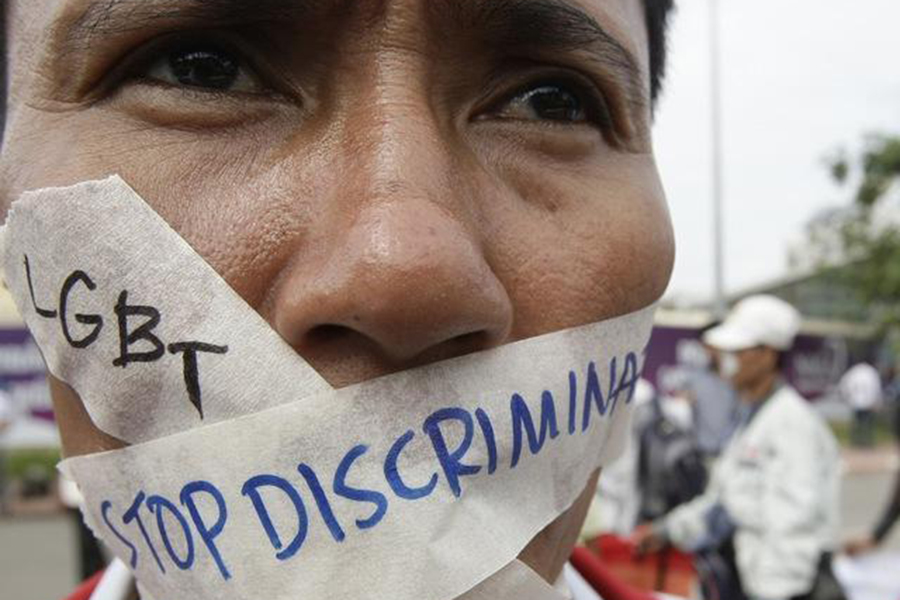As the Equality Act fails to move forward in Congress yet again, a new Pew Research study and a new Gallup poll show that a majority of Americans don’t think LGBT people face discrimination. Among young adults, the demographic traditionally most supportive of LGBT rights, perceptions of discrimination against gay and lesbian people dropped by 16 points.
According to the poll, only 55 percent of Americans believe that gay and lesbian people face discrimination in the United States, down from 68 percent in 2013. Noticeable in the polling is that it did not reference bisexual or transgender people. None of the questions in the polling related to discrimination in employment, housing, education or healthcare — the areas in which most LGBT people face discrimination. Nor is there any reference to violence or hate crimes.
What the data suggests is that when lesbian and gay people won the fight for marriage equality in 2015, non-LGBT people thought anti-LGBT discrimination ended. In 1996, the first year Gallup polled the question, only 27 percent of Americans supported marriage equality. In 2019, 67 percent support allowing gay and lesbian people to marry. However, as shown by the continued hate crimes reported in the news, LGBT discrimination has not ended, despite what the poll participants may think.
According to Public Religion Research Institute (PRRI) polling, this attitude toward LGBT people is the opposite of what polls indicate about other minority groups. In every instance, Americans say discrimination against groups like Muslims, Jews, women and blacks has increased. The numbers of Americans who believe LGBT people may have over-stepped their claims of discrimination has also risen. PRRI found that recent U.S. Supreme Court cases in which lesbian and gay couples cited discrimination over wedding cakes, florists and public accommodations, saw an increase in support for religion-based refusal to serve lesbian and gay couples.
Following the 2018 U.S. Supreme Court cases, nearly half (46 percent) of Americans believe that the owners of wedding-based businesses, such as caterers, florists and bakers, should be allowed to refuse to serve same-sex couples if serving them violates their own religious beliefs. Nearly the same number (48 percent) said these types of businesses should be required to serve same-sex couples. But a year earlier, before the SCOTUS cases, a majority (53 percent) of the public said wedding-based businesses should be required to serve gay and lesbian couples, while 40 percent said they should not.
A 2019 Gallup poll shows that most Americans think LGBT people are no longer being discriminated against, while the overwhelming majority polled said they are “totally satisfied” with the level of acceptance LGBT people have at present and believe the fight for gay rights is “increasingly unnecessary.” Slightly less than half (46 percent) of Americans said new laws — like the Equality Act — are not necessary to reduce discrimination against gay and lesbian people. The PRRI survey found that nearly the same percentage — including 81 percent of Republicans — believe the country has made the changes needed to give gay and lesbian people equal rights.
Other details show lesbian and gay rights have never been a priority for the average voter, even during the peak fight over marriage equality between 2004, when it was legalized in Massachusetts, and the 2015 U.S. Supreme Court ruling. On a list of 16 issues, a Pew poll found that the treatment of LGBT people ranked last in the percentage of people who said it was important to their vote in the 2018 election, even though a record number of LGBT people were running for Congress.
Yet LGBT people have reported rising instances of harassment and discrimination in all areas of their lives. A 2017 Harvard study found that a majority of self-identified LGBT people reported facing slurs or offensive comments. LGBT people having received threats because of sexual and/or gender identity as well as being sexual harassed were also widely reported in the study. The Harvard study results parallel a 2013 Pew Research Study that found a nearly identical number (58 percent) of LGBT people said they had been subjected to slurs or jokes based on their sexual orientation or gender identity. Added to this unchanging experience of discrimination by LGBT people is government data showing that violence against LGBT people is increasing.
The Gallup poll asked if gay and lesbian sexual relations should be legal and 28 percent of respondents said no. While this number was double in 1979 when the question was first asked, it’s stunning that this is both still a debatable question and that so many Americans still object.
One in three polled said lesbian and gay relationships are “morally wrong” and 42 percent of those who regularly attend religious services said their clergy mentions “homosexuality” as morally wrong.
These and other details in polling and studies should signal concern for both LGBT people and LGBT rights organizations. The message that LGBT people still face not just discrimination but actual physical violence based on their sexual orientation and/or gender identity is not reaching the general population, even among people 35 and under. With nearly two more years of the Trump administration’s repressively anti-gay and anti-trans policies, it’s critical that this misconception be addressed by key organizations like HRC (Human Rights Campaign) and that pressure be placed on legislators to recognize the actual facts of LGBT discrimination and pass legislation to address the problem.
